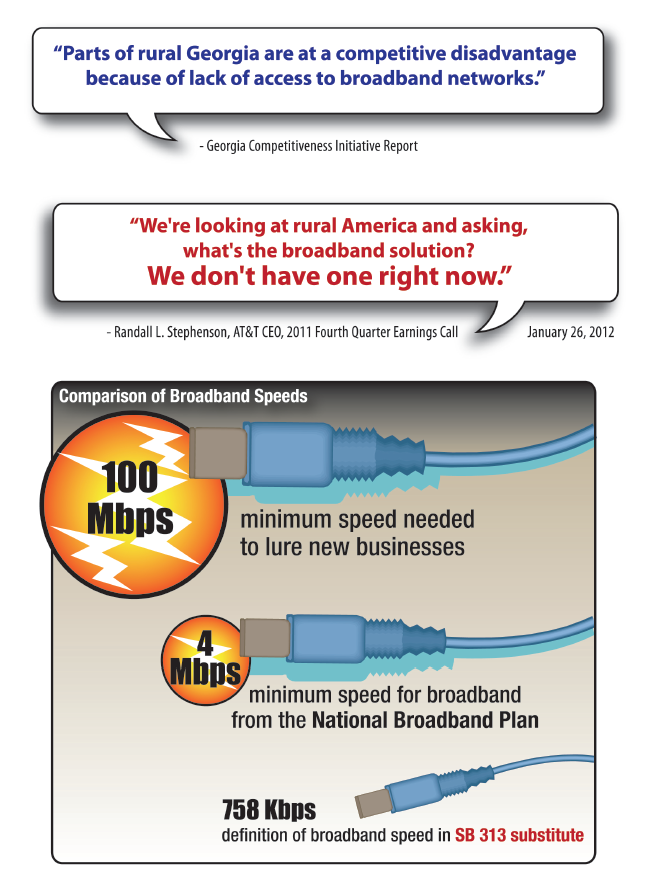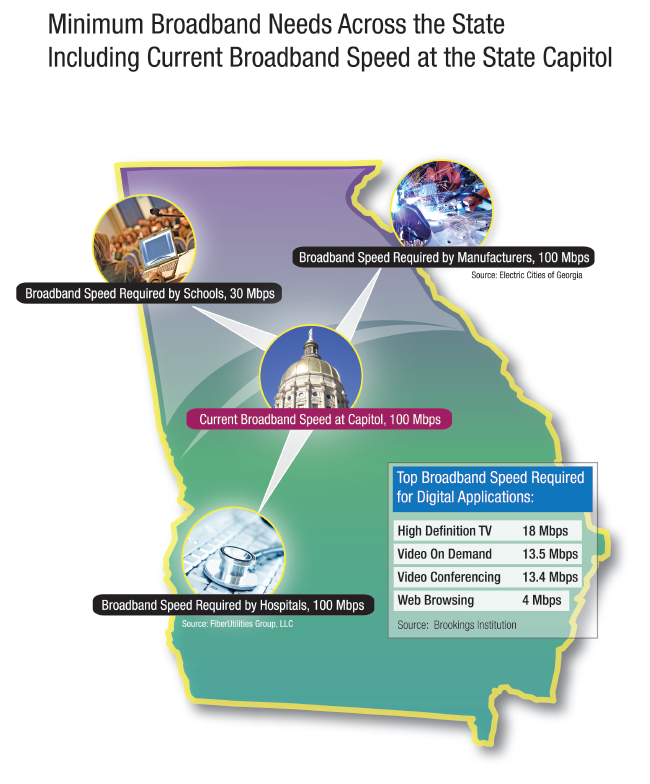
Fast, affordable Internet access for all.

If you missed Chris in D.C. at the New America Foundation on May 28th, you can still catch the action via the archived presentation.
Chris joined Joanne Hovis, Will Aycock, and Catharine Rice to discuss "Localism Over Consolidation: An Exploration of Public Broadband Options." New America Foundation writes:
Today, more and more communities are thinking of broadband as a local issue. Even large cities like Baltimore, Seattle and New York have recently begun public discussions about ways to improve broadband services and what role the local government could play in that improvement. Current technology policy debates about net neutrality and the potential Comcast-Time Warner Cable merger mean it is more important than ever that local governments play a more active role in ensuring their communities do not get left behind in the digital age.
New America’s Open Technology Institute presented a discussion of various approaches to local investment in broadband. The panel featured a diverse set of experts on public broadband networks and projects, including the manager of a municipal fiber network in Wilson, NC. Panelists discussed different approaches communities have taken so far and share thoughts on what steps other local governments can take going forward to support access to affordable and high-speed broadband.
The discussion runs just under 90 minutes.
New America Foundation's Open Technology Institute will host "Localism Over Consolidation: An Exploration of Public Broadband Options" from 9:30 - 11 a.m. on May 28th. Chris will be participating in the discussion; if you can't make it to DC, the event will be live streamed.
Conversation will focus on different approaches to improve connectivity and community strategies to make those approaches successful.
From the event page:
Today, more and more communities are thinking of broadband as a local issue. Even large cities like Baltimore, Seattle and Los Angeles have recently begun public discussions about ways to improve broadband services and what role the local government could play in that improvement. Current technology policy debates about net neutrality and the potential Comcast-Time Warner Cable merger mean it is more important than ever that local governments play a more active role in ensuring their communities do not get left behind in the digital age.
Joining Chris:
Sarah Morris, Senior Policy Counsel at the New America Open Technology Institute will moderate. You can sign up for the event and livestream on the 28th at the event page.
This March 21-22, the SouthEast Association of Telecommunications Officers and Advisors (SEATOA) will be hosting the "Networking Communities for the New South" conference. The conference will be held at the Omni Charlotte Hotel.
We are excited to see Susan Crawford as the keynote speaker. From the conference page:
She will provide a broadband policy reality check, and answer – among other questions –whether current so-called “level playing field”, “free-market” policies are leaving us with a second class network that only the rich can afford.
(For a preview, listen to Susan in a recent Broadband Bits Podcast. She talked about her recent book and discussed the need for long term U.S. telecom policy change.)
Check out the schedule and list of other speakers [PDF] and start planning your itinerary. You can also register online.
Some of the issues discussed will be:
The National Association of Counties (NACo) gave us permission to reprint an article they recently wrote in their County News publication. NACo advocates for county governments on federal policy that impacts local decsion and local control. NACo is based in Washington, D.C.
In the article, author Charles Taylor discusses the perils of Oconee and Orangeburg Counties in South Carolina, both involved in broadband projects supported by stimulus funds. Because of a new law passed this past summer, those projects are in danger and the possibility of future projects is all but extinguished.
Rural counties' broadband projects face uncertainty
The success of two South Carolina counties’ plans to provide broadband access to rural areas could be in jeopardy because of a new state law that severely restricts public broadband projects. It also essentially bans new ones.
Oconee and Orangeburg counties received more than $27 million in federal stimulus funds in 2010 for rural broadband projects.
A South Carolina law, enacted in July, requires local governments that offer broadband Internet services to charge rates similar to those of private companies, even if the government could provide the service at a lower cost and the area is not served by commercial providers.
“It effectively prohibits municipalities from operating their own broadband systems through a series of regulatory and reporting requirements,” said Catharine Rice, president of the SouthEast Association of Telecommunications Officers and Advisors (SEATOA). “These practically guarantee municipalities could never find financing because the requirements would render even a private sector broadband company inoperable.”

 Note, that AT&T was originally trying to define broadband at the absurd 200kbps level but a substitute bill would have bumped it up to a still-too-low 768kbps, which is referenced above.
The other flyer that apparently made a difference with legislators is here:
Note, that AT&T was originally trying to define broadband at the absurd 200kbps level but a substitute bill would have bumped it up to a still-too-low 768kbps, which is referenced above.
The other flyer that apparently made a difference with legislators is here:
 Rememeber that elected officials often think of broadband in binary terms. You have it or you don't. In their mind, if you have options aside from dial-up, the problem is solved. These are people that often do not know what is needed to attract economic development, work efficiently from home, or successfully compete remote education courses.
Graphics that explain why we need next-generation networks rather than simply expanding last-century DSL can be remarkably helpful.
Rememeber that elected officials often think of broadband in binary terms. You have it or you don't. In their mind, if you have options aside from dial-up, the problem is solved. These are people that often do not know what is needed to attract economic development, work efficiently from home, or successfully compete remote education courses.
Graphics that explain why we need next-generation networks rather than simply expanding last-century DSL can be remarkably helpful.Thus, the Plan recommends that Congress clarify that State and local governments should not be restricted from building their own broadband networks. I firmly believe that we need to leverage every resource at our disposal to deploy broadband to all Americans. If local officials have decided that a publicly-owned broadband network is the best way to meet their citizens’ needs, then my view is to help make that happen. One example of a town that took control of its own digital destiny – Bristol, Virginia saw additional jobs created in that area. And last month I heard Lafayette, Louisiana’s City-Parish President, describe the development of economic opportunities in his city, that were a direct result of the fiber network built by the community. Right here in North Carolina, I understand that Wilson and Salisbury are trying to invest in fiber optic systems, that they hope will transform their local economies. When cities and local governments are prohibited from investing directly in their own broadband networks, citizens may be denied the opportunity to connect with their nation and improve their lives. As a result, local economies likely will suffer. But broadband is not simply about dollars and cents, it is about the educational, health, and social welfare of our communities. Preventing governments from investing in broadband, is counter –productive, and may impede the nation from accomplishing the Plan’s goal of providing broadband access to every American and every community anchor institution.I can only hope that North Carolina's Legislature listen to this speech before they vote on preempting communities from building broadband networks.